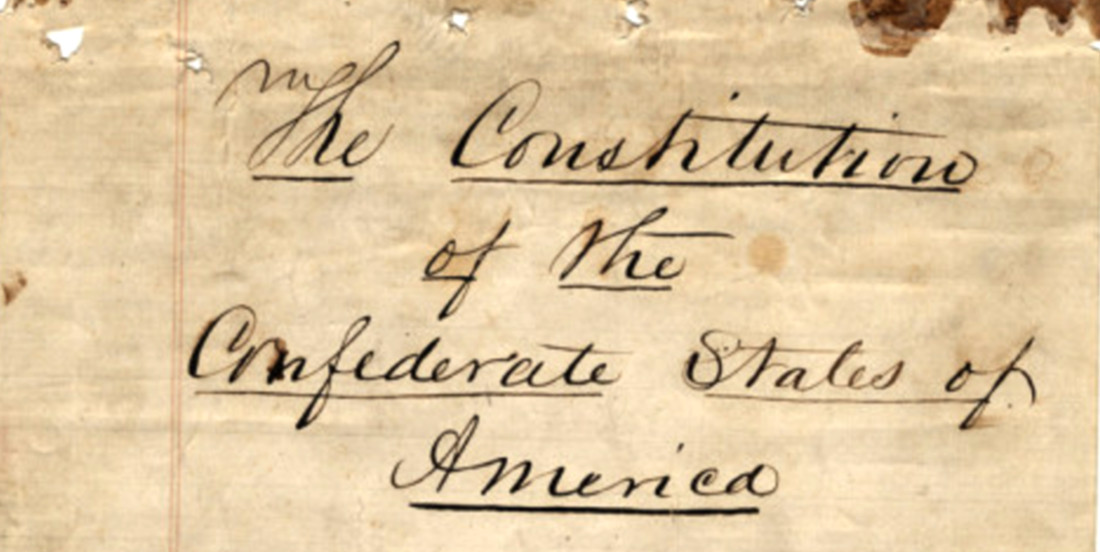Slavery in the Confederate and US Constitutions
On this day in 1861, secessionists adopted the constitution of the Confederate States of America in its capital, Montgomery, Alabama. How did the document ensure slavery was “recognized and protected” & how did it compare and contrast to the US Constitution on slavery? Explore the topics of history, slavery, and US Constitution.

Ibram X. Kendi
Partner • #GirlDad • Scholar @BU_Tweets • Dir @AntiracismCtr • @NationalBook Award Winner • #1 NYT Bestselling Author • MacArthur Fellow • Surviving Cancer 🐍

-
On this day in 1861, secessionists adopted the constitution of the Confederate States of America in its capital, Montgomery, Alabama. How did the document ensure slavery was “recognized and protected” & how did it compare and contrast to the US Constitution on slavery? A 🧵1/ pic.twitter.com/80UG1LKftH
— Ibram X. Kendi (@DrIbram) March 11, 2023 -
Let's be clear: Both constitutions were written with a bended knee to enslavers. But while enslavers in 1787 had to compromise somewhat with antislavery forces, their successors in 1861 had free rein to tailor a document best suited for their political and economic interests. 2/ pic.twitter.com/EhHrEDvByl
— Ibram X. Kendi (@DrIbram) March 11, 2023 -
Some framers of the US Constitution saw hypocrisy in founding a country on the principle of freedom while enslaving and indenturing people. So, they did what Americans still do when racializing: deployed euphemisms like “person held to service or labor." 3/ pic.twitter.com/k4dmvmJJDA
— Ibram X. Kendi (@DrIbram) March 11, 2023 -
By contrast, Confederates used "slave" 10 times in their constitution. They used “negro slavery” and “negro slaves” to make explicit that their polity was founded on "the great truth that the negro is not equal to the white man," as CSA VP Alexander Stephens said in 1861. 4/ pic.twitter.com/5zodB6Hwjn
— Ibram X. Kendi (@DrIbram) March 11, 2023 -
Like the US Constitution, the Confederates included the 3/5ths clause. It stated: “Representatives and direct taxes shall be apportioned” based on the number of free people—including White indentured servants and excluding Indigenous peoples—plus “three-fifths of all slaves.” 5/ pic.twitter.com/V8pAekt5Qe
— Ibram X. Kendi (@DrIbram) March 11, 2023 -
The CSA Constitution stated enslavers "shall have the right" to take enslaved people to all Confederate states and territories. (Northern states had passed “personal-liberty laws” making it harder for enslavers to travel North with the enslaved or kidnap Black northerners.) 6/ pic.twitter.com/KfeBlGNjYu
— Ibram X. Kendi (@DrIbram) March 11, 2023 -
Any new territories the Confederates acquired would allow "negro slavery." Enslavers had, in part, seceded over slavery's expansion being stymied in the U.S. by northern abolitionists & western advocates of free soil (land free of Black & Native people, enslaved or free). 7/ pic.twitter.com/nIEwLuH9XT
— Ibram X. Kendi (@DrIbram) March 11, 2023 -
Enslavers had planned to expand their enslaving empire to the West and South, particularly into Central America and the Caribbean. They were intent on protecting slavery abroad, namely in Brazil and Cuba, as historian @karpmj shows in his book, THIS VAST SOUTHERN EMPIRE. 8/ pic.twitter.com/xETbb1Dcn4
— Ibram X. Kendi (@DrIbram) March 11, 2023 -
The Confederate Constitution banned the international human trade, which the U.S. Constitution did not do (allowing it until 1808). Confederates forbade the “importation of negroes” to win British recognition and entice the Union border states to join the Confederacy. 9/ pic.twitter.com/btm9QaFs11
— Ibram X. Kendi (@DrIbram) March 11, 2023 -
Confederates ensured slavery's permanence w/ clauses like, “No bill of attainder, ex post facto law, or law denying or impairing the right of property in negro slaves shall be passed.” BTW, this hellish constitution opened "invoking the favor and guidance of Almighty God." 10/ pic.twitter.com/6lz2gNzimB
— Ibram X. Kendi (@DrIbram) March 11, 2023 -
When someone tells you that Confederates were about “states' rights” or “southern pride,” point out that their Constitution left enslavers proud on this day in 1861 that they had permanently protected "negro slavery" and prohibited "states' rights" to pass antislavery laws. 11/11 pic.twitter.com/T6gaC3tsQ6
— Ibram X. Kendi (@DrIbram) March 11, 2023
